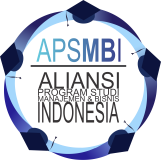Anteseden dari kinerja usaha skala kecil dan menengah: Peran orientasi kewirausahaan dan dukungan pemerintah
Abstract
The focus of this study is to look at performance of SMEs in Padang Pariaman Regency, particularly the role of entrepreneurial orientation and government support as antecedents. The method used in this study was a quantitative. The owners-managers of SMEs in Padang Pariaman Regency made up the study's population. The sample size for this study was 140 respondents, and the sampling technique was non-probability. SEM analysis with Smart-PLS (PLS-SEM) was used as an analysis approach. The findings of this study show that: (1) innovation has no impact on performance; (2) proactive has no effect on performance; (3) risk-taking has a significant impact on performance; (4) aggressiveness has an impact on performance; (5) autonomy has a significant impact on performance; and (6) government support has a significant impact on performance. The implications will be provided in the chapter.
Keywords: Innovation, pro-active, risk taking, aggressive, autonomi, government support, SMES performance
Keywords
Full Text:
PDFReferences
Aidoo, S. O., Agyapong, A., Acquaah, M., & Akomea, S. Y. (2021). The performance implications of strategic responses of SMEs to the covid-19 pandemic: Evidence from an African economy. Africa Journal of Management, 7(1), 74-103.
Bank Indonesia (2012). Komunitas Produk/Jasa Unggulan (KPJu) Sumatera Barat tahun 2011. Bank Indonesia.
Basheer, M. F., Raoof, R., Jabeen, S., & Hassan, S. G. (2021). Exploring the Nexus Among the Business Coping Strategy: Entrepreneurial Orientation and Crisis Readiness–A Post-COVID-19 Analysis of Pakistani SMEs. In Handbook of Research on Entrepreneurship, Innovation, Sustainability, and ICTs in the Post-COVID-19 Era (pp. 317-340). IGI Global.
Bourletidis, K. (2013). The strategic management of market information to SMEs during economic crisis. Procedia-Social and Behavioral Sciences, 73, 598-606.
Bourletidis, K., & Triantafyllopoulos, Y. (2014). SMEs survival in time of crisis: strategies, tactics and commercial success stories. Procedia-Social and Behavioral Sciences, 148, 639-644.
Boso, N., Story, V. M., & Cadogan, J. W. (2013). Entrepreneurial orientation, market orientation, network ties, and performance: Study of entrepreneurial firms in a developing economy. Journal of Business Venturing, 28(6), 708-727.
Covin, J. G., & Wales, W. J. (2012). The measurement of entrepreneurial orientation. Entrepreneurship Theory and Practice, 36(4), 677-702.
Ciampi, F., Demi, S., Magrini, A., Marzi, G., & Papa, A. (2021). Exploring the impact of big data analytics capabilities on business model innovation: The mediating role of entrepreneurial orientation. Journal of Business Research, 123, 1-13.
Cooper, D.R., dan Schindler, P.S. 2003. Business Research Methods, Eight Edition, McGraw- Hill/Irwin, New York,NY 10020
Covin, J. G., & Slevin, D. P. (1989). Strategic management of small firms in hostile and benign environments. Strategic Management Journal, 10(1), 75-87.
Covin, J. G., Green, K. M., & Slevin, D. P. (2006). Strategic process effects on the entrepreneurial orientation sales growth rate relationship. Entrepreneurship Theory and Practice, 30(1), 57-81.
Dess, G.G. & Lumpkin, G.T. (2005). The role of entrepreneurial orientation in Stimulating effective corporate Entrepreneurship. Academy of Management Executive, 19 (1), 147-156.
Hair, J.F., Black, W.C., Babim, B.J., Anderson, R.E., & Tatham, R.L. (2006). Multivariate Data Analysis, sixth edition. Pearson International Edition.
Hair, J. F., Risher, J. J., Sarstedt, M., & Ringle, C. M. (2019). When to use and how to report the results of PLS-SEM. European Business Review. 31(1), 2-24
Hamdani, J., & Wirawan, C. (2012). Open innovation implementation to sustain Indonesian SMEs. Procedia Economics and Finance, 4, 223-233.
Hernández-Perlines, F., Covin, J. G., & Ribeiro-Soriano, D. E. (2021). Entrepreneurial orientation, concern for socioemotional wealth preservation, and family firm performance. Journal of Business Research, 126, 197-208.
Hooley, G. J., Greenley, G. E., Cadogan, J. W., & Fahy, J. (2005). The performance impact of marketing resources. Journal of Business Research, 58(1), 18-27.
Kraus, S., Rigtering, J. C., Hughes, M., & Hosman, V. (2012). Entrepreneurial orientation and the business performance of SMEs: a quantitative study from the Netherlands. Review of Managerial Science, 6(2), 161-182.
Lestari, D., & Susanto, P. (2021). Orientasi kewirausahaan dan kapabilitas pemasaran pada kinerja usaha kecil dan menengah: Peran faktor lingkungan yang dinamis sebagai pemoderasi. Jurnal Kajian Manajemen Bisnis, 10(1), 46-57.
Lumpkin, G. T., & Dess, G. G. (1996). Clarifying the entrepreneurial orientation construct and linking it to performance. Academy of Management Review, 21(1), 135-172.
Li, H., & Atuahene-Gima, K. (2001). Product innovation strategy and the performance of new technology ventures in China. Academy of Management Journal, 44(6), 1123-1134.
Miller, D. (1983). The correlates of entrepreneurship in three types of firms. Management Science, 29(7), 770-791.
Stephan, U., Uhlaner, L. M., & Stride, C. (2015). Institutions and social entrepreneurship: The role of institutional voids, institutional support, and institutional configurations. Journal of International Business Studies, 46(3), 308-331.
Shu, C., De Clercq, D., Zhou, Y., & Liu, C. (2019). Government institutional support, entrepreneurial orientation, strategic renewal, and firm performance in transitional China. International Journal of Entrepreneurial Behavior & Research.
Susanto, P., Abdullah, N. L., & Wardi, Y. (2019). Entrepreneurial orientation: prioritising and mapping in the context of small and medium-sized enterprises. Polish Journal of Management Studies, 20(1), 429-446.
Xiao, Z., Chen, X., Dong, M. C., & Gao, S. (2021). Institutional support and firms’ entrepreneurial orientation in emerging economies. Long Range Planning, 102106.
Wales, W. J., Kraus, S., Filser, M., Stöckmann, C., & Covin, J. G. (2021). The status quo of research on entrepreneurial orientation: Conversational landmarks and theoretical scaffolding. Journal of Business Research, 128, 564-577.
Wardi, Y., Susanto, P., & Abdullah, N. L. (2017). Orientasi kewirausahaan pada kinerja usaha kecil dan menengah (UKM) Sumatera Barat: Analisis peran moderasi dari intensitas persaingan, turbulensi pasar dan teknologi. Journal of Technology Management, 16(1), 46-61.
Wardi, Y., Susanto, P., Abror, A., & Abdullah, N. L. (2018). Impact of entrepreneurial proclivity on firm performance: The role of market and technology turbulence. Pertanika J Soc. Sci. & Hum, 26, 241-250.
Wesarat, P. O., Majid, A. H., Shari, M. Y., Khaidir, A., & Susanto, P. (2018). Mediating effect of job satisfaction on the relationship between work-life balance and job performance among academics: Data screening. International Journal of Engineering & Technology, 7, 214-216.
DOI: http://dx.doi.org/10.24036/jkmw02101670



